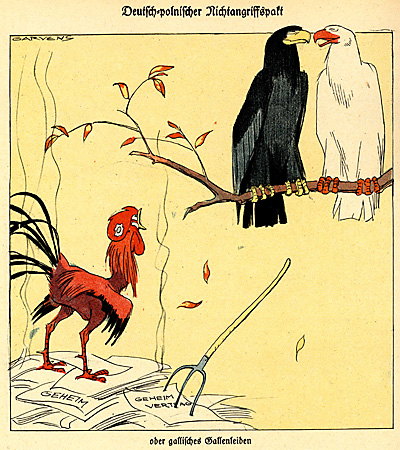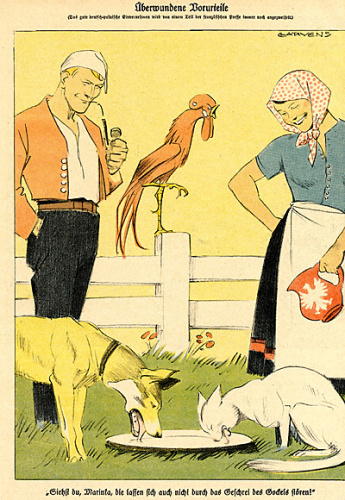Ok, I’ll start with events leading to the signing of this pact.
I. I’ll start with the Munich agreement as it’s curse and outcome had a significant role in laying the foundation for the German-Soviet cooperation.
The foreign policy of Reich developed in a different way than Hitler wanted. From 1933 to 1939, Hitler was striving for a guarantee for open hand policy from London. These aspirations, however, failed. UK indeed have chosen the policy of appeasement as British government wanted to avoid military conflict, yet, that policy of appeasement did not mean a total indifference to Central and Eastern Europe.
With the eruption of the Sudeten crisis the Soviet Union itself proposed to call for the conference of power states. In the end, Soviet Union wasn’t invited to the meeting between the democratic and fascist states in Munich. Such turn of events had a significant impact on the Soviet foreign policy as the doctrine of collective security developed and advocated by Soviet Minister of Foreign Affairs Maksim Litvinov seemed to be impossible to implement. The Litvinov’s idea of collective security, in short, boils down to tightening relationships with Western democracies (France and Great Britain) and forging anti-German alliance.
March 10, 1939, during the meeting of the XVIII Congress of the Communist Party of the Soviet Union in Moscow, Joseph Stalin made a speech that went down in history under a name “the chestnut speech”. During the Congress, Stalin, to the surprise of the gathered party members, he presented the Third Reich for better material for a friend and ally than Western democratic states. The leader of the Soviet Union at the same time criticized the Western capitalist states in his speech, which he accused of inciting war and attempts to draw the USSR into a conflict against the German Reich.
The name “chestnut speech” came directly from the words of Stalin, who stated that he would not allow the Soviet Union “to be dragged into conflicts by warmongers who were used to others pulling out chestnuts from the campfire for them” Stalin in his speech also claimed that the anti-Comintern pact wasn’t directed against the USSR, but against Western capitalist countries like England, France, and the USA.
“Chestnut speech” met with an enthusiastic reaction from Berlin and was a turning point in improving Germany’s relations with Soviet Russia immediately before the outbreak of World War
In May 3rd, 1939 Joseph Stalin dismissed Maksim Litwinow from the post of Minister of Foreign Affairs, and on the same day, he appointed Vyacheslav Molotov in his place. Molotov was one of the Joseph’s most trusted men and just like Stalin he too was in favor of working together with Germans. Stalin and Molotov did not intend to conclude agreements with Western democracies, and as consequence, take on the main burden of fighting against the Third Reich.
II. The Prague operation how it affected the foreign relations between IIIrd Rech, Poland, and Soviet Union.
The Plan to extend the occupation over the r whole territory of Czechoslovakia was followed by intensifying contacts with Warsaw. Poland received a proposition of alliance against the Soviet Union. For obvious reasons Soviets were concerned about this situation and were determined to prevent the Polish-German cooperation from happening.
In fact, it wasn’t completely new situation, Hitler, and politicians of IIIrd Reich were aiming towards tightening the relations with Poland for quite some time, which had to cause concerns among the Soviet leaders.
Some examples of German propaganda/satirical drawings:

German satirical political magazine “Kladderadatsch”. Caricature from December 10, 1933. The inscription at the top: “German-Polish pact of non-aggression”, bottom: “or Gallic pouring of bile”.

“Overcoming prejudices (part of the French press is still questioning good German-Polish relations).” Symbolizing Germany, Michel says to a Polish girl: “You see, Marinko, they do not mind even crowing a cock!” Kladderadatsch, July 28, 1935
Ok, back to the case:
III. The Pact
Thankfully for the Soviet Union, Polish Minister of Foreign Affairs, Józef Beck, was following the “balance” doctrine proposed by Józef Piłsudski. Assumptions of this doctrine were that Poland should not take any decisive actions against Germany and the USSR trying to simultaneously balance between both powerful neighbors. Its primary goal was to maintain equal relations with Berlin and Moscow, a kind of political balance while maintaining a safe “distance” from them.
Józef Beck was trying to delay the negotiations and to give a definitive answer. This undefined situation was retained until 31 March 1939 when British Prime Minister Neville Chamberlain announced British unilateral guarantees to Poland. Following this, as well as Poland’s refusal to join Third Reich as (temporary or not, I won’t speculate about this here) ally Germany decides to push the issues of the exterritorial corridor to East Prussia and the Danzig question in order to lay a foundation for future casus belli against Poland.
All these events lead to the signing of the Ribbentrop-Molotov Pact. It was formally a non-aggression pact, however, the Secret Additional Protocol constituting an annex to the official document, it concerned the partition of territories or regulation of the independence of sovereign states: Poland, Lithuania, Latvia, Estonia, Finland, and Romania. In Polish literature, this document is often referred to as “The Fourth Partition of Poland”. British historian Norman Davies referred to it in a similar manner.
The main document is composed of seven articles:
Article I
Both High Contracting Parties obligate themselves to desist from any act of violence, any aggressive action, and any attack on each other, either individually or jointly with other Powers.
Article II
Should one of the High Contracting Parties become the object of belligerent action by a third Power, the other High Contracting Party shall in no manner lend its support to this third Power.
Article III
The Governments of the two High Contracting Parties shall in the future maintain continual contact with one another for the purpose of consultation in order to exchange information on problems affecting their common interests.
Article IV
Should disputes or conflicts arise between the High Contracting Parties, neither shall participate in any grouping of Powers whatsoever that is directly or indirectly aimed at the other party.
Article V
Should disputes or conflicts arise between the High Contracting Parties over problems of one kind or another, both parties shall settle these disputes or conflicts exclusively through friendly exchange of opinion or, if necessary, through the establishment of arbitration commissions.
Article VI
The present Treaty is concluded for a period of ten years, with the proviso that, in so far as one of the High Contracting Parties does not advance it one year prior to the expiration of this period, the validity of this Treaty shall automatically be extended for another five years.
Article VII
The present treaty shall be ratified within the shortest possible time. The ratifications shall be exchanged in Berlin. The Agreement shall enter into force as soon as it is signed.
As well as additional four articles of the Secret Additional Protocol:
Article I
In the event of a territorial and political rearrangement in the areas belonging to the Baltic States (Finland, Estonia, Latvia, Lithuania), the northern boundary of Lithuania shall represent the boundary of the spheres of influence of Germany and U.S.S.R. In this connection, the interest of Lithuania in the Vilna area is recognized by each party.
Article II
In the event of a territorial and political rearrangement of the areas belonging to the Polish state, the spheres of influence of Germany and the U.S.S.R. shall be bounded approximately by the line of the rivers Narev, Vistula and San.
The question of whether the interests of both parties make desirable the maintenance of an independent Polish state and how such a state should be bounded can only be definitely determined in the course of further political developments.
In any event, both governments will resolve this question by means of a friendly agreement.
Article III
With regard to Southeastern Europe, attention is called by the Soviet side to its interest in Bessarabia. The German side declares its complete political disinterest in these areas.
Article IV
This protocol shall be treated by both parties as strictly secret.
Uff, it took me way more time than I expected. It is way too detailed to fit into an episode but I trust you to fish out the most interesting stuff.
Sourecs:
Poland Betrayed: The Nazi-Soviet Invasions of 1939 David G. Williamson
God’s Playground: A History of Poland vol. 2 Norman Davies
Między Berlinem a Moskwą. Stosunki niemiecko-sowieckie 1939–1941, Warszawa 2007 (Between Berlin and Moscow. German-Soviet relations 1939-1941, Warsaw 2007) Sławomir Dębski

